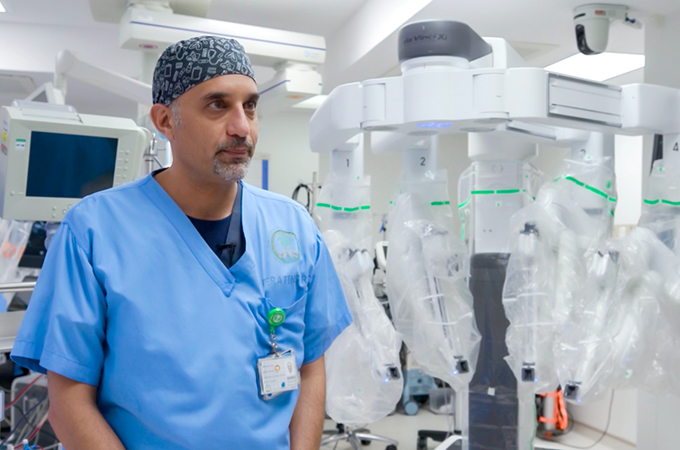Autumn 2024
With over two decades of experience, Dr Feras Khaliel, Head of Cardiac Surgery and Director of the Robotics and Minimally Invasive Surgery Program at King Faisal Specialist Hospital & Research Centre, stands at the forefront of robotic surgery innovation.
We delve into the life and accomplishments of the pioneering surgeon who led the world’s first fully robotic cardiac procedure.
Can you share with us information on your early education and your journey into the field of cardiac surgery? What inspired you to specialise in this area?
I completed my MD at King Saud University (Riyadh) in 2002 and pursued a general surgery residency there. I trained in many hospitals in Europe and the US. My fascination with the heart’s complexity inspired me to specialise in cardiac surgery, driven by the potential to enhance patients’ quality of life. I’ve been drawn to advanced technologies throughout my career, leading me to embrace robotic surgery as a natural progression for precision and minimally invasive care. I lead the Robotics and Minimally Invasive Surgery Program at KFSHRC, focusing on advancing patient care through innovation and mentoring the next generation of cardiac surgeons.
What are some of your key achievements/experiences in the field?
Through my work at KFSHRC, I have had the privilege of developing one of the most extensive robotic cardiac programmes outside the United States. We achieved significant success in robotic cardiac surgeries, performing over 400 procedures with a 98 per cent survival rate. Additionally, I have extensive experience managing Ventricular Assist Devices (VADs) and other advanced cardiac interventions, which have considerably improved patient outcomes and reduced recovery times.
How do you hope your work will influence future generations of surgeons and the medical community?
I want my work to inspire young surgeons to embrace the power of innovation and encourage them to experience the importance of being adaptable. We can offer previously thought-impossible solutions by integrating technologies like robotics and AI. By pushing these boundaries, I believe we can redefine patient care standards, making safer and more effective treatments the norm.
What advice would you give aspiring surgeons or medical professionals in Saudi Arabia looking to innovate?
My advice to aspiring surgeons in Saudi Arabia is to master their foundational practice and curriculum thoroughly. Excellence begins with perfecting what is already in place. Second, always prioritise the patient’s best interest and aim for optimal outcomes.
Our motivation for pursuing a robotic heart transplant was our desire to improve the patient’s quality of life, reduce complications, and ensure a quicker recovery and shorter hospital stay. The patient’s welfare must always be the guiding principle, and all procedures must adhere to strict safety protocols.
When developing innovations, it’s crucial to consult with experienced professionals in the field and practice thoroughly before applying new methods. Research advisory committees and ethics boards should also be involved to ensure that any new technology is introduced safely and responsibly, with a clear focus on achieving outcomes at least equal to, if not better than, conventional approaches.
Lastly, I encourage them to keep dreaming. Their potential in this field is limitless with proper planning and adequate support.
How has this experience of conducting the world’s first fully robotic cardiac surgery changed you personally and professionally?
Conducting the world’s first fully robotic cardiac surgery has deeply impacted me professionally and personally. Professionally, the successful outcome has inspired us to expand this approach to more patients, broadening acceptance of minimally invasive techniques and reducing complications. It has driven us to innovate continuously, pushing beyond existing global standards to create better tools and practices. The achievement has boosted the team’s morale, positioning our center as a leader in robotic cardiac surgery, and has enhanced opportunities for training and medical tourism.
Personally, this experience has brought significant responsibility and pride as we inspire other surgeons globally. However, it has reduced my personal and family time. To address this, I have expanded the surgical team to distribute the workload better, ensuring a balance between professional duties and quality time with loved ones.



